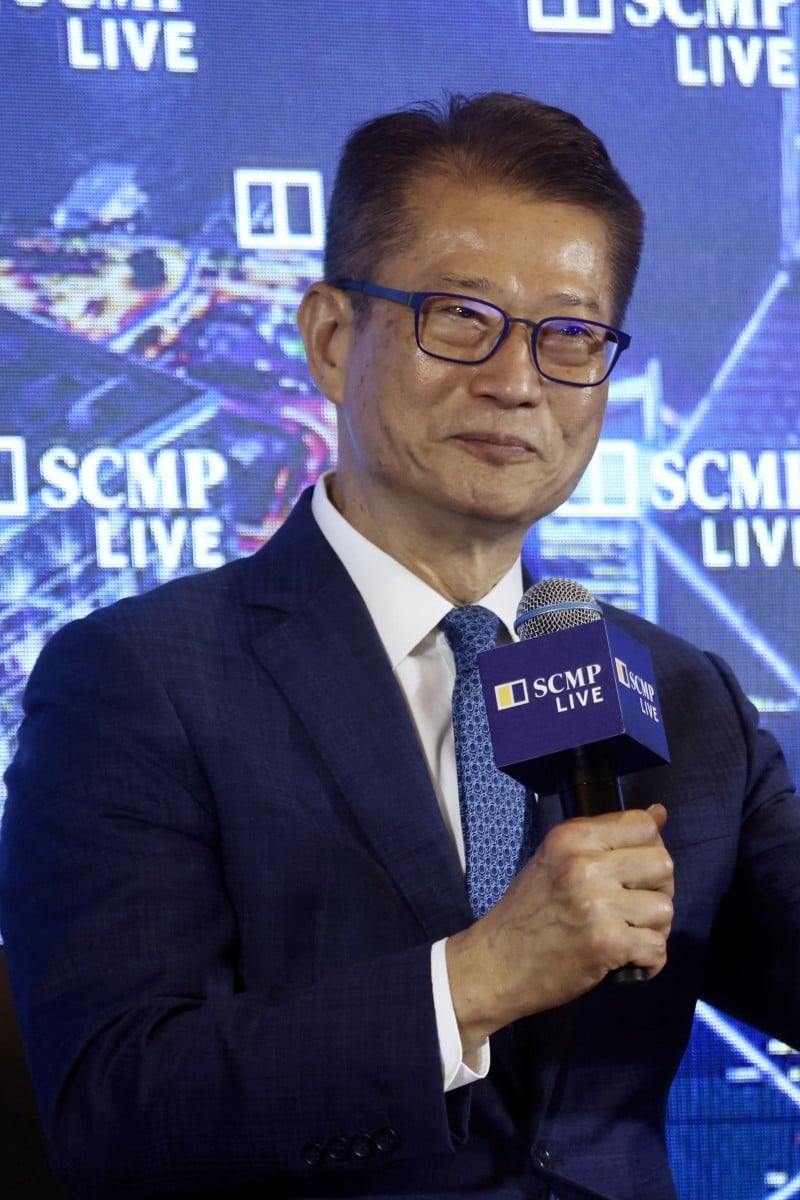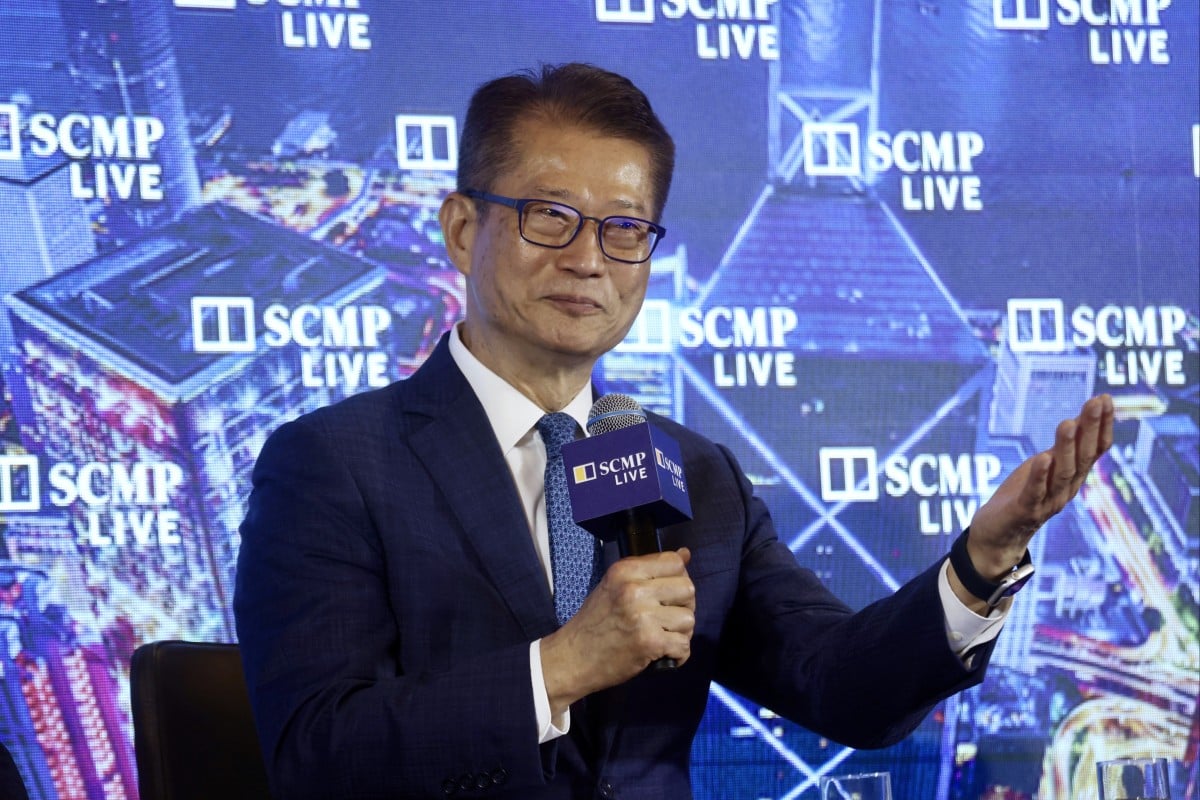
Deep Dive: Hong Kong’s latest budget plans include reduced spending on education, public servant pay freeze
Finance chief Paul Chan said a HK$2,500 student grant would be scrapped as the city faces a deficit of more than HK$87 billion.
 Financial Secretary Paul Chan Mo-po speaks at the Redefine Hong Kong Series 2025: Budget Edition SCMP Live event on March 3, 2025. Photo: Jonathan Wong
Financial Secretary Paul Chan Mo-po speaks at the Redefine Hong Kong Series 2025: Budget Edition SCMP Live event on March 3, 2025. Photo: Jonathan WongDeep Dive delves into hot issues in Hong Kong and mainland China. Our easy-to-read articles provide context to grasp what’s happening, while our questions help you craft informed responses. Check sample answers at the end of the page.
News: News: Hong Kong government axes HK$2,500 student grant in latest budget
-
City’s finance chief delivered his budget speech last month under mounting pressure to save money
-
Government will ask Hong Kong’s eight public universities to return HK$4 billion from their reserves
The Hong Kong government will cut an annual HK$2,500 grant for nearly 800,000 students and reduce public university funding by HK$2.8 billion over three years. It will also reclaim HK$4 billion from the reserves of eight public universities.
Paul Chan Mo-po, the city’s financial secretary, announced the cost-saving measures in his budget address last month. They are meant to help the city ease its deficit of HK$87.2 billion.
The amount spent on education will drop by 2.3 per cent to HK$102.9 billion in the 2025-26 financial year, saving HK$2 billion annually. A government source defended the student grant cut. They said it had been distributed indiscriminately, and other financial aid programmes were available for those in need.
Chan’s budget allocated HK$68.1 billion to the eight universities, HK$2.8 billion less than the HK$70.9 billion proposed by the University Grants Committee (UGC). The UGC confirmed an average 4 per cent reduction in funding over three years.
Committee Chairman Tim Lui Tim-leung said he understood the government’s financial situation. He added that the universities would continue striving for excellence with the resources available.
An Education Bureau paper revealed that funding cuts would be phased in over three years. They will start with a 2 per cent reduction in 2025-26, repeated in 2026-27 and 2027-28. Universities must operate within their revised budgets and return HK$4 billion of their HK$11 billion reserves. This money was originally meant for general and developmental purposes.
Deep Dive: Rising costs in Hong Kong means more people are buying second-hand, shopping abroad
Parents have expressed disappointment over the removal of the HK$2,500 grant. “It surely will cause some inconvenience for some families,” said Ray Hau Hon-shek, chairman of the North District Federation of Parent-Teacher Associations. However, he said he understood the financial need for the cut.
Ngai Shan-ting, president of the Federation of Parent-Teacher Association of Kowloon City, said underprivileged families would be affected. Still, the grant was originally considered a bonus rather than an essential aid.
Observers think that Hong Kong may enter an era of structural deficit. There are questions about whether the situation will reach a tipping point that affects the city’s credit rating. This, in turn, could impact Hong Kong’s efforts to find new drivers for growth.
Observers said Chan must demonstrate strong political will and embrace bold reforms to address funding challenges. It would also require a delicate balancing act that avoided frustrating those already in financial hardship while instilling faith in the city’s long-term development.
Staff writers
Question prompts
1. What is the main reason given by the government for cutting the HK$2,500 student grant?
(1) The grant was no longer needed.
(2) It was given indiscriminately, regardless of financial background.
(3) Parents requested a different form of support.
(4) There are existing schemes to help students in need.
A. (1), (3) only
B. (2), (3) only
C. (3), (4) only
D. (2), (4) only
2. How much will public university funding be reduced over three years?
3. Do you agree with the government’s decision to cut the student grant? Explain using News, Glossary and your own knowledge.
Illustration
1. Based on the Illustration, what challenges did finance chief Paul Chan face regarding the budget for this year?
2. Using News, Glossary and your own knowledge, explain what factors contributed to the challenges faced by Chan.
Chart
1. Which three government departments have the highest public spending estimates for 2024-25, and how much is allocated to each?
2. In your opinion, which government department should monitor and reduce its spending and why? Explain using News, Issue and your own knowledge.
Issue: Hong Kong aims to save money with public servant pay freeze, revisions to transport subsidy
-
City’s HK$2 fare scheme for elderly and disabled commuters will have new restrictions for beneficiaries
-
Government will invest money in technology-related initiatives to promote Hong Kong as a hub for AI
Hong Kong’s finance chief Paul Chan Mo-po’s belt-tightening budget seeks to tap new sources of revenue and ease the city’s HK$87.2 billion deficit, starting with a pay freeze for all public servants, downsizing 10,000 civil service positions and changes to a government transport subsidy.
The HK$2 fare scheme for elderly commuters and people with disabilities will be revised under the new budget. Beneficiaries will be capped at 240 subsidised trips per month and will need to pay 20 per cent of the full fare if a trip surpasses HK$10.
From 2019-20 and 2023-24, the scheme cost the government more than HK$10 billion, with the amount increasing by more than 200 per cent during that period. The annual cost was expected to balloon to HK$4.6 billion in 2024-25 and reach HK$5.6 billion in 2025-26. The changes to the scheme are expected to take effect from September of next year.
This year marks the third year in a row the city’s financial books will be in the red – meaning Hong Kong is spending and owing more money than it makes – although the deficit is down from last year’s HK$101.6 billion. Fiscal reserves will shrink to a decade-low of HK$647.3 billion.
Deep Dive: Hong Kong’s tourism blueprint aims to bring billions to the economy
With no eye-catching sweeteners to offer residents, Chan opted instead for an across-the-board pay freeze for government employees.
He also said the government would invest money in turning Hong Kong into a centre for artificial intelligence (AI), allocating HK$1 billion to establish the Hong Kong AI Research and Development Institute, among other technology-related initiatives worth billions.
“We have to seize the opportunity to make the most out of this critical window to speed up our development, establishing the new before abolishing the old,” Chan said.
“Transformation and innovation will lead our way into the future, and we are poised to fast-track the high-quality development of Hong Kong’s economy.”
He added that Hong Kong would host the first International Young Scientist Forum on AI to promote its R&D as an industry, such as the application of the open-source chip architecture RISC-V.
Politicians and professional groups seeking ways to save money have naturally focused on areas with the highest government spending.
At HK$120 billion, social welfare ranks first, accounting for about a fifth of the estimated total recurrent government expenses for 2024-25, followed by healthcare and education.
Staff writers
Question prompts
1. What key measures were introduced in Hong Kong’s latest budget to address the deficit?
(1) Increasing public servant salaries.
(2) Expanding the civil service workforce.
(3) Implementing a pay freeze for government employees.
(4) Capping the HK$2 public transport fare at 240 trips per month
A. (1), (3) only
B. (2), (3) only
C. (3), (4) only
D. (2), (4) only
2. List TWO ways the government plans to invest in technology, according to Issue.
3. How might the budget cuts and revised policies impact different sectors of Hong Kong’s economy and society? Explain using News, Issue, Glossary and your own knowledge.
Glossary
indiscriminately: done in a way that does not show careful choices or planning
deficit: when a business or country spends more money than it receives
structural deficit: the portion of a government’s budget deficit that would continue even when the economy is operating at its full potential
credit rating: a measure of the ability of a business or government to meet its financial obligations by looking at its history of borrowing and repaying loans
sweeteners: monetary benefits or payments to residents, such as consumption vouchers or electricity subsidies
Sample answers
News
1. D
2. HK$2.8 billion
3. I do not agree with the Hong Kong government’s decision to cut the HK$2,500 student grant. The grant provided financial relief to nearly 800,000 students. Removing it will cause difficulties for many families, particularly those from underprivileged backgrounds.
Parents have expressed disappointment over the decision, with many feeling that the government is unfairly tightening its budget at the expense of students. Although some acknowledge the government’s financial difficulties, the grant provided crucial support for families. Removing it could increase the financial burden on parents, affecting students’ access to educational resources.
Instead of cutting the grant entirely, the government could have implemented a more targeted approach, ensuring that those who truly need assistance continue to receive it. The decision ultimately prioritised cost-cutting over student welfare, which is not the best approach to supporting education. (accept all reasonable answers)
Illustration
1. Balancing between the fiscal reserve – the amount of money the government has – and reviving the economy
2. Hong Kong needs to save money to battle its budget deficit while still giving its citizens the services they need. Cutting education funding could affect students, universities, and Hong Kong’s broader financial landscape. For students, the removal of the annual HK$2,500 grant may create financial strain, especially for families who rely on it, though the government argues that other aid programmes are available.
For universities, the HK$2.8 billion funding reduction over three years and the requirement to return HK$4 billion in reserves will likely force institutions to adjust their budgets. This may affect research capabilities, academic resources, and overall operations. (accept all reasonable answers)
Chart
1. The Social Welfare Department has the highest allocation, with HK$120.14 billion. The Health Bureau follows with HK$99.86 billion, while the Education Bureau is third with HK$79.57 billion
2. The Hong Kong Police Force has an estimated budget of HK$27.81 billion, which is higher than the University Grants Committee’s budget of HK$23.99 billion. I think the police department could monitor its budget and look for ways to save money in order to avoid cuts to educational spending. Educational funding cuts could affect students, universities, and Hong Kong’s broader financial landscape and could create financial strain on families. These cuts could have more long-term impacts than ones to the police budget. (accept all reasonable answers)
Issue
1. C
2. Despite budget cuts, the government is allocating HK$1 billion to establish the Hong Kong AI Research and Development Institute. It is also investing in other technology-related initiatives and plans to host the first International Young Scientist Forum on AI to promote research and development in artificial intelligence.
3. The budget cuts and revised policies could have several long-term impacts on Hong Kong. Cuts in education spending might impact the quality of education and future workforce development.
The revision of the HK$2 fare scheme could ease government expenses but may place a financial burden on elderly commuters and people with disabilities, limiting their mobility. However, investing in AI research and technology-related initiatives could help drive economic transformation and innovation, positioning Hong Kong as a leader in emerging industries.
Overall, while the measures aim to reduce the deficit, they may lead to social challenges, and their success will depend on how well the government balances fiscal responsibility with social welfare and economic growth. (accept all reasonable answers)